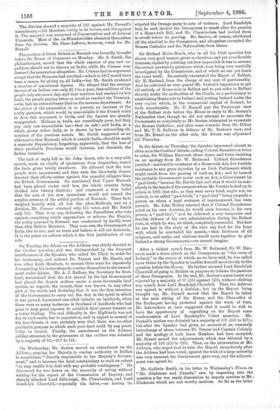The position of Great Britain in Burmah was formally brought
before the House of Commons on Monday. Mr. S. Smith, the philanthropist, moved that the whole expense of any new ex- pedition should not be thrown on India, while Mr. Cremer con- demned the annexation altogether. Mr. Cremer had no argument except that the Burmese had revolted—which in 1857 would have been a reason for giving up all India—but Mr. Smith produced a number of sensational figures. He alleged that the average income of an Indian was only 22 14s. a year, that millions of the people only ate once a day, and that taxation had reached its last limit, the people paying twice as much as reached the Treasury, —the last an extraordinary libel on the revenue department. As the object Gf the annexation is to prevent an increase of the costly garrison, which would be unavoidable if the French ruled in Ava, this argument is futile, and the figures are greatly exaggerated. Millions in India are exceedingly poor, but they pay only one unavoidable tax—that on salt—and India, as a whole, grows richer daily, as is shown by her astounding ab sorption of the precious metals. Mr. Smith suggested as an alternative that Burmah, which is outside India, should be made a separate Dependency, forgetting, apparently, that the loss of these profitable Provinces would increase, not diminish, the Indian taxation.


































 Previous page
Previous page